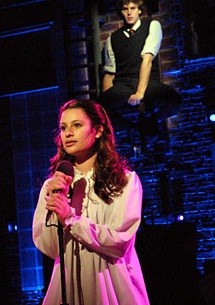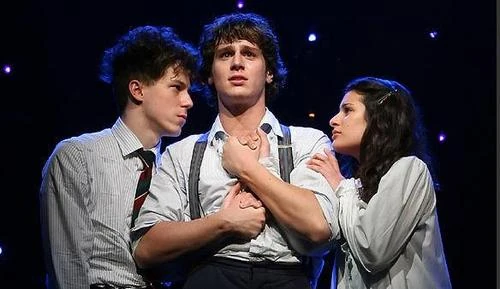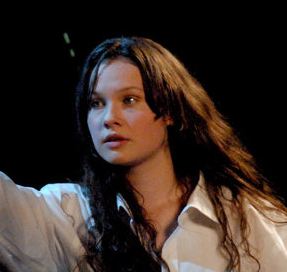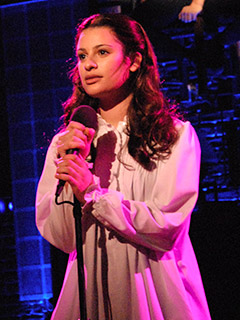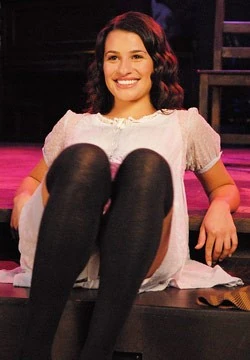Tags: Visual edit apiedit |
(just added some details) Tag: rte-wysiwyg |
||
| Line 39: | Line 39: | ||
== Background == |
== Background == |
||
| − | '''''Wendla Bergmann '''''(May 5, 1878 - October 27, 1892) is a 14 year old girl living with her mother in Germany. Her father is not mentioned. Wendla is naive about adult relationships but very charitable and kind. Wendla is close friends with Martha Bessell, Anna and Thea. She has an older sister ([[Ina Muller]]) who is married with two children, she is the daughter of [[Frau Bergmann]], and childhood friends with [[Moritz Stiefel]], [[Melchior Gabor]] and [[Ilse Neumann]]. Wendla is the female lead of the play and the musical, and dies in both. Lea Michele played Wendla in the Original Broadway Cast. In the 2015 revival she was portrayed by deaf actress Sandra Mae Frank and hearing vocalist Katie Boeck. |
+ | '''''Wendla Bergmann '''''(May 5, 1878 - October 27, 1892) is a 14 year old girl living with her mother in Germany. Her father is not mentioned. Wendla is naive about adult relationships but very charitable and kind. Wendla is close friends with Martha Bessell, Anna and Thea. She has an older sister ([[Ina Muller]]) who is married with two children, she is the daughter of [[Frau Bergmann]], and childhood friends with [[Moritz Stiefel]], [[Melchior Gabor]] and [[Ilse Neumann]]. Wendla is the female lead of the play and the musical, and dies in both. Lea Michele played Wendla in the Original Broadway Cast. In the 2015 revival she was portrayed by deaf actress Sandra Mae Frank and hearing vocalist Katie Boeck. |
== Plot == |
== Plot == |
||
| Line 67: | Line 67: | ||
Wendla is sweet and very innocent, but she has a streak of defiance and some dark undertones to her personality, underneath all that sweetness. She's fascinated with death, specifically her own, and her desire to experience real, intense emotions and sensations sometimes drive her to take drastic measures. She's very intelligent and compassionate, she's extremely curious about the world around her, but most of all, she's just a teenager discovering herself and coming into her own for the first time. Though she cannot articulate it, she is very repressed by her situation and resents it. She wants freedom and independence and equality with men. That being said, other readings of the script show a willful innocence to Wendla in order to prolong her childhood and this is not necessarily inaccurate either. |
Wendla is sweet and very innocent, but she has a streak of defiance and some dark undertones to her personality, underneath all that sweetness. She's fascinated with death, specifically her own, and her desire to experience real, intense emotions and sensations sometimes drive her to take drastic measures. She's very intelligent and compassionate, she's extremely curious about the world around her, but most of all, she's just a teenager discovering herself and coming into her own for the first time. Though she cannot articulate it, she is very repressed by her situation and resents it. She wants freedom and independence and equality with men. That being said, other readings of the script show a willful innocence to Wendla in order to prolong her childhood and this is not necessarily inaccurate either. |
||
| − | She is attracted to Melchior, both romantically and sexually, and him to her. There is a kinship between them in both the play and the musical as they understand each other well intellectually and can have the deep debates that Melchior clearly yearns for. To Wendla he is someone to talk to and satisfy her lust for knowledge. A central tragedy to their relationship (despite her obvious rape and death) is that Wendla and Melchior are '''''incredibly compatible''''' both romantically, emotionally, and sexually. In a society where he is taught to view girls as inferior and submissive and where both are given inaccurate sexual education, their relationship is doomed from the start. A major point to Wedekind's play is not that Wendla and Melchior are incompatible but that the society turns their relationship into the fatal rape it becomes. |
+ | She is attracted to Melchior, both romantically and sexually, and him to her. There is a kinship between them in both the play and the musical as they understand each other well intellectually and can have the deep debates that Melchior clearly yearns for. To Wendla he is someone to talk to and satisfy her lust for knowledge. A central tragedy to their relationship (despite her obvious rape and death) is that Wendla and Melchior are '''''incredibly compatible''''' both romantically, emotionally, and sexually. In a society where he is taught to view girls as inferior and submissive and where both are given inaccurate sexual education, their relationship is doomed from the start. A major point to Wedekind's play is not that Wendla and Melchior are incompatible but that the society turns their relationship into the fatal rape it becomes. |
There is a deep sadness in Wendla from the very beginning of the play. She is utterly in the dark about everything around her and yearns for knowledge on a level even more than Melchior does. She has an anger towards her mother that she can only articulate in "Mama Who Bore Me" while being sweet and genial towards her mother outside of the song world. On the other hand a part of her wants to remain a child and not grow up and she is willfully ignorant. She's an incredibly complex child. She is very different from her friends and finds herself thinking more mature thoughts than anyone she knows. She is empathetic towards Martha but also wants to experience what she is going through in a twisted sadomasochistic way. There is a selfishness to Wendla Bergmann. And there is an anger, there is a defiance and a power. She is a bundle of contradictions who is seen as simply "a sweet girl" by everyone around her, a fatal flaw of her society. |
There is a deep sadness in Wendla from the very beginning of the play. She is utterly in the dark about everything around her and yearns for knowledge on a level even more than Melchior does. She has an anger towards her mother that she can only articulate in "Mama Who Bore Me" while being sweet and genial towards her mother outside of the song world. On the other hand a part of her wants to remain a child and not grow up and she is willfully ignorant. She's an incredibly complex child. She is very different from her friends and finds herself thinking more mature thoughts than anyone she knows. She is empathetic towards Martha but also wants to experience what she is going through in a twisted sadomasochistic way. There is a selfishness to Wendla Bergmann. And there is an anger, there is a defiance and a power. She is a bundle of contradictions who is seen as simply "a sweet girl" by everyone around her, a fatal flaw of her society. |
||
| + | == Fun Facts == |
||
| − | == Fun FactsShe donates food, money, and clothing to those less fortunate. == |
||
* challenges Melchior's beliefs a lot more in the play but still a little in the musical and that is what initially draws them together |
* challenges Melchior's beliefs a lot more in the play but still a little in the musical and that is what initially draws them together |
||
* Deaf in the Deaf West production of Spring Awakening. |
* Deaf in the Deaf West production of Spring Awakening. |
||
| − | * Originally, at the end of "I Believe," Wendla was supposed to scream but they took that part out. |
||
* Wendla is an aunt. |
* Wendla is an aunt. |
||
| + | * She donates money and clothes to those less fortunate, in the play with her mother's prompting, and in the musical as a part of her youth group |
||
* Has sadomasochistic tendencies as exhibted in the scene before "The Dark I Know Well," the beating scene, and in the hayloft scene when she communicates that she wanted the beating and in a way enjoyed it |
* Has sadomasochistic tendencies as exhibted in the scene before "The Dark I Know Well," the beating scene, and in the hayloft scene when she communicates that she wanted the beating and in a way enjoyed it |
||
* On her tombstone, it said she died of anemia rather than died of a botched abortion. |
* On her tombstone, it said she died of anemia rather than died of a botched abortion. |
||
| + | * In the play she dies not of a botched abortion but of an overdoes on an abortive substance she drank |
||
| + | * In the play her tombstone says "blessed are the pure of heart" meant to highlight the provincial obsession with purity and the falseness of their society as Wendla's "sin" was what inevitably killed her |
||
* Bergmann is a Jewish surname |
* Bergmann is a Jewish surname |
||
* She is much darker, yet still incredibly naive in the play |
* She is much darker, yet still incredibly naive in the play |
||
| + | * She asks her mother to let her walk around with out underwear in the play |
||
* Wendla has a sister |
* Wendla has a sister |
||
| + | * In the play she says she is incredibly proud to be a girl and would kill herself if she was anything else, but says she wishes only to have boys as she thinks to be a girl loved by a boy is the greatest thing in the world |
||
| + | * In the play she consistently combats Melchior's theories about society, taking more of a socialist like stance towards his feelings of a lack of need for charity if it doesn't make one feel good. In the musical she takes the same stance that the poor must be helped and society must work for everyone, though Melchior agrees with her. |
||
| + | * Her first and last words of the musical are her shouting "mama" |
||
* The consenuality of her sex with Melchior is an oft debated point, despite her lack of knowledge on sex, how she tells him to stop and he convinces her that it's "okay" and that she only doesn't want it because the adults have told her it's wrong. Many concede that she was coerced into having sex but will deny that it was rape, despite the fact that sexual coercion is under the dubious consent umbrella and thus, because it's not 100%, enthusiastic consent, rape. |
* The consenuality of her sex with Melchior is an oft debated point, despite her lack of knowledge on sex, how she tells him to stop and he convinces her that it's "okay" and that she only doesn't want it because the adults have told her it's wrong. Many concede that she was coerced into having sex but will deny that it was rape, despite the fact that sexual coercion is under the dubious consent umbrella and thus, because it's not 100%, enthusiastic consent, rape. |
||
| − | ** In |
+ | ** In the play it's undeniably rape and Melchior even admits to such. |
** A recording of "I Believe" from a 2001 workshop at the Roundabout Theatre, featuring Lea Michelle and Gavin Creel, has a piercing scream from Wendla at the end of the song. The scream is toned down/virtually removed and the meaning all together changed by 2006 in the Off-Broadway Debut. One could insinuate in 2001 the show represented the Hayloft Scene as rape, but decided to change the interpretation somewhere between 2001-2006. |
** A recording of "I Believe" from a 2001 workshop at the Roundabout Theatre, featuring Lea Michelle and Gavin Creel, has a piercing scream from Wendla at the end of the song. The scream is toned down/virtually removed and the meaning all together changed by 2006 in the Off-Broadway Debut. One could insinuate in 2001 the show represented the Hayloft Scene as rape, but decided to change the interpretation somewhere between 2001-2006. |
||
Revision as of 15:10, 6 May 2017
Wendla Bergmann is the female lead of the Spring Awakening play and musical, and the tritagonist overall. She dies in both from a botched abortion. Lea Michele played Wendla in the Original Broadway Cast.
Background
Wendla Bergmann (May 5, 1878 - October 27, 1892) is a 14 year old girl living with her mother in Germany. Her father is not mentioned. Wendla is naive about adult relationships but very charitable and kind. Wendla is close friends with Martha Bessell, Anna and Thea. She has an older sister (Ina Muller) who is married with two children, she is the daughter of Frau Bergmann, and childhood friends with Moritz Stiefel, Melchior Gabor and Ilse Neumann. Wendla is the female lead of the play and the musical, and dies in both. Lea Michele played Wendla in the Original Broadway Cast. In the 2015 revival she was portrayed by deaf actress Sandra Mae Frank and hearing vocalist Katie Boeck.
Plot
Act 1
The play opens with Wendla, who has just turned fourteen. Desperate to understand sex she asks her mother multiple times before her mother turns her away, telling her to ask her when she's older
Next we see Wendla with her friends discussing Martha's home life, she tries to comfort Martha, but does not truly understand her pain. To help herself understand she asks Melchior (who finds her daydreaming as he is walking through the forest) to beat her with a stick. First he is reluctant but soon shows no remorse and starts hurting her, before running off.
In the musical there is an additional scene before this when Wendla meets Melchior in the forest and the two discuss church and some socialistic ideas about industry. There is a clear attraction between them though they are both awkward and uncomfortable. Melchior repeatedly advances upon her, trying to hold her hand and make her stay with him longer, and though she is unsure and clearly reluctant, she relents.
Wendla is unaware of how sex works, but does no longer believe in the stork, as her mother wants her to. This is shown straight away in the musical, however takes a little longer for the play to express this.
Hayloft Scene
In the musical Melchior advances on Wendla in the hayloft under the false pretense that Wendla is in love with him and wants to have sex, however Wendla, who is interested in Melchior but is scared and unready for sex, panics, as she does not understand what is happening. She eventually relents (particularly upon him mentioning love and manipulating her earlier words about wanting to "feel something"), but still does not want to engage in the sexual activity; despite Melchior forcing himself on her.
In the play, Wendla had a crush on Melchior but does not appreciate his advances on her in the hayloft; her protests, however, only spur Melchior on, as he assures her that love does not exists and his raping of her is perfectly fine and acceptable.
The rape leads to Wendla getting pregnant with his child, in both the play and the Musical
Act Two
Wendla's mother finds a letter addressed to her from Melchior, she discovers her daughter sexual intercourse, and tries to fine Judge Gabor (Melchior's Father) as well as enlighten him on the situation. Frau Bergmann scolds Wendla for acting in such a manner. Wendla defends herself in saying it is her mothers fault for not telling her everything. Wendla is taken to a shady place where she is given a botched abortions by Mother Schmidt, at the cost to her life.
Wendla supports Melchior as a spirit at the end of the musical, she does not appear again in the play.
Personality
Wendla is sweet and very innocent, but she has a streak of defiance and some dark undertones to her personality, underneath all that sweetness. She's fascinated with death, specifically her own, and her desire to experience real, intense emotions and sensations sometimes drive her to take drastic measures. She's very intelligent and compassionate, she's extremely curious about the world around her, but most of all, she's just a teenager discovering herself and coming into her own for the first time. Though she cannot articulate it, she is very repressed by her situation and resents it. She wants freedom and independence and equality with men. That being said, other readings of the script show a willful innocence to Wendla in order to prolong her childhood and this is not necessarily inaccurate either.
She is attracted to Melchior, both romantically and sexually, and him to her. There is a kinship between them in both the play and the musical as they understand each other well intellectually and can have the deep debates that Melchior clearly yearns for. To Wendla he is someone to talk to and satisfy her lust for knowledge. A central tragedy to their relationship (despite her obvious rape and death) is that Wendla and Melchior are incredibly compatible both romantically, emotionally, and sexually. In a society where he is taught to view girls as inferior and submissive and where both are given inaccurate sexual education, their relationship is doomed from the start. A major point to Wedekind's play is not that Wendla and Melchior are incompatible but that the society turns their relationship into the fatal rape it becomes.
There is a deep sadness in Wendla from the very beginning of the play. She is utterly in the dark about everything around her and yearns for knowledge on a level even more than Melchior does. She has an anger towards her mother that she can only articulate in "Mama Who Bore Me" while being sweet and genial towards her mother outside of the song world. On the other hand a part of her wants to remain a child and not grow up and she is willfully ignorant. She's an incredibly complex child. She is very different from her friends and finds herself thinking more mature thoughts than anyone she knows. She is empathetic towards Martha but also wants to experience what she is going through in a twisted sadomasochistic way. There is a selfishness to Wendla Bergmann. And there is an anger, there is a defiance and a power. She is a bundle of contradictions who is seen as simply "a sweet girl" by everyone around her, a fatal flaw of her society.
Fun Facts
- challenges Melchior's beliefs a lot more in the play but still a little in the musical and that is what initially draws them together
- Deaf in the Deaf West production of Spring Awakening.
- Wendla is an aunt.
- She donates money and clothes to those less fortunate, in the play with her mother's prompting, and in the musical as a part of her youth group
- Has sadomasochistic tendencies as exhibted in the scene before "The Dark I Know Well," the beating scene, and in the hayloft scene when she communicates that she wanted the beating and in a way enjoyed it
- On her tombstone, it said she died of anemia rather than died of a botched abortion.
- In the play she dies not of a botched abortion but of an overdoes on an abortive substance she drank
- In the play her tombstone says "blessed are the pure of heart" meant to highlight the provincial obsession with purity and the falseness of their society as Wendla's "sin" was what inevitably killed her
- Bergmann is a Jewish surname
- She is much darker, yet still incredibly naive in the play
- She asks her mother to let her walk around with out underwear in the play
- Wendla has a sister
- In the play she says she is incredibly proud to be a girl and would kill herself if she was anything else, but says she wishes only to have boys as she thinks to be a girl loved by a boy is the greatest thing in the world
- In the play she consistently combats Melchior's theories about society, taking more of a socialist like stance towards his feelings of a lack of need for charity if it doesn't make one feel good. In the musical she takes the same stance that the poor must be helped and society must work for everyone, though Melchior agrees with her.
- Her first and last words of the musical are her shouting "mama"
- The consenuality of her sex with Melchior is an oft debated point, despite her lack of knowledge on sex, how she tells him to stop and he convinces her that it's "okay" and that she only doesn't want it because the adults have told her it's wrong. Many concede that she was coerced into having sex but will deny that it was rape, despite the fact that sexual coercion is under the dubious consent umbrella and thus, because it's not 100%, enthusiastic consent, rape.
- In the play it's undeniably rape and Melchior even admits to such.
- A recording of "I Believe" from a 2001 workshop at the Roundabout Theatre, featuring Lea Michelle and Gavin Creel, has a piercing scream from Wendla at the end of the song. The scream is toned down/virtually removed and the meaning all together changed by 2006 in the Off-Broadway Debut. One could insinuate in 2001 the show represented the Hayloft Scene as rape, but decided to change the interpretation somewhere between 2001-2006.





